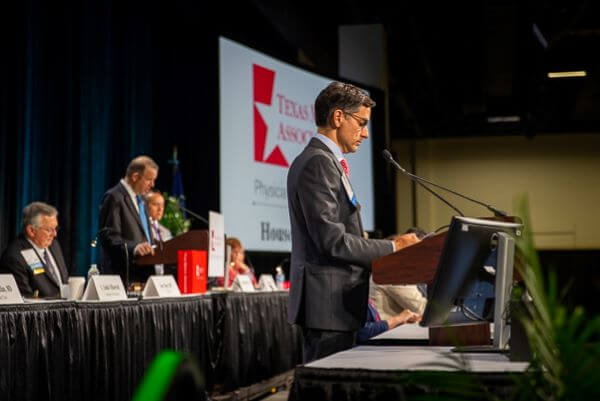
Texas physicians continue to face increasing industry consolidation and worsening administrative burdens, both of which threaten practice viability – and, with it, patients’ access to care.
Responding to these concerns, the Texas Medical Association’s House of Delegates focused on policies that could help bolster physicians’ defenses while addressing other economic pressures voiced before the Reference Committee on Socioeconomics during TexMed in Fort Worth May 18-20.
Practice viability was a recurring theme during TMA’s annual policymaking session, earning its place as a central tenet of the TMA Board of Trustees’ new five-year strategic plan and as the policy aim of several reports and resolutions.
Delegates approved a report by TMA’s Ad Hoc Committee on Independent Physician Practice, updating existing TMA policy to define independent physician practice as “one or more physicians with decision-making authority and responsibility for the viability of the medical practice in which they own a controlling interest.” The report also directs TMA to develop additional resources for physicians in independent practice.
Sue Bailey, MD, an allergist and immunologist in Fort Worth who co-chairs the ad hoc committee, endorsed its adoption.
“TMA has long been a champion of independent practice, but it’s obvious that being a champion is no longer enough to sustain independent practice,” Dr. Bailey testified before the reference committee.
Delegates also adopted new language for TMA’s policy on vertical consolidation in health care, including directing the association to:
- Support state legislative efforts to address vertical consolidation and potential antitrust violations in the health care industry; and
- Request that the American Medical Association evaluate these issues at the federal level.
“Vertical consolidation in health care is rapidly transforming our way of life, our opportunities, and, quite frankly, our destiny,” El Paso internist Roxanne Tyroch, MD, testified on behalf of TMA’s Lone Star Caucus before the reference committee.
Tackling yet another thorn in physicians’ side, delegates directed TMA to support the elimination of prior authorizations for all medications, heeding the reference committee’s recommendation and enthusiastic support from member physicians.
Sugar Land internist Elizabeth Torres, MD, testified that the measure served patients as much as physicians, given the care delays associated with prior authorization requirements.
“This resolution’s not wishful thinking,” she told the reference committee on May 18. “It’s imperative.”
And in the wake of federal rules designed to give patients immediate access to their medical information, delegates successfully urged TMA to ask the Texas Legislature to allow at least 72 hours before having to release or post to the patient’s portal results from lab or other diagnostic testing , giving physicians time to deliver results to patients directly, especially when the information is sensitive.
The move bolsters TMA’s efforts at the Texas Capitol this session in support of Senate Bill 1467 by Sen. Kelly Hancock (R-North Richland Hills), which similarly would modify sensitive medical test disclosures under the federal rules to protect patients. Having passed both chambers, SB 1467 now heads to Gov. Greg Abbott’s desk.
Among other business, delegates:
- Adopted two new policies, one advocating for standardization of electronic hospital discharge data and the other on medical records retention policies whether the patient visit is by telemedicine or in person.
- Adopted a report calling for TMA to submit a recommendation to the Centers for Medicaid & Medicaid Services for a new place-of-service code to support street medicine practices and for TMA to educate physicians about the benefits of street medicine.
- Amended existing policy, directing TMA to advocate for additional state and federal funding, including direct payment, for uncompensated emergency services and trauma care, which Dallas anesthesiologist Christopher Cook, DO, called a “longstanding and pressing issue that affects a large number of TMA members” during testimony.
- Voted against a policy proposal on noncompete agreements in physician employment contracts. TMA member physicians provided mixed testimony on the topic, which has garnered state and federal attention. Testimony cited that the issue was debated in recent years resulting in the Council on Socioeconomics creating a 2022 report on the issue which was accepted by the TMA House of Delegates in 2022. “Every community, every physician, works in a unique situation. This is a complex issue,” Greg Fuller, MD, a family physician in Keller and the outgoing chair of that council, testified at TexMed 2023.
For more information on TMA’s House of Delegates, check out TMA’s website. For more information on TMA’s Medical Economics division, click here.
Emma Freer
Associate Editor
(512) 370-1383